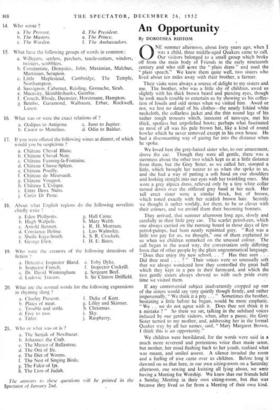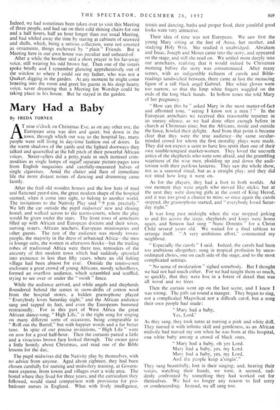An Opportunity
. . NE summer afternoon, about forty years ago, when I
0
was a child, three middle-aged Quakers came to call.
Our visitors belonged to a small group which broke off from the main body of Friends in the early nineteenth century and who still wore the " plain dress " and used the " plain speech." We knew them quite well, two sisters who lived about ten miles away with their brother, a farmer.
Their visits were always a source of delight to my sisters and me. The brother, who was a little shy of children, awed us slightly with his thick brown beard and piercing eyes, though he took much trouble to entertain us by showing us his collec- tion of fossils and odd stones when we visited him. Awed or not, we lost no detail of his clothes—the neatly folded white neckcloth, the collarless jacket and the thin round legs of his rather rough trousers which, innocent of turn-ups, met his thick, spotless but unpolished boots; perhaps what fascinated us most of all was his pale brown hat, like a kind of round bowler which he never removed except in his own house. He had a disconcerting way of gazing far into the distance when he spoke. , We loved best the grey-haired sister who, to our amazement, drove the car. Though they were all gentle, there was a sternness about the other two which kept us at a little distance from them, but the Grey. Sister, as we called her, stooped- a little, which brought her nearer to us when she spoke to us, and she had a way of putting a soft hand on our shoulders and looking straight into our eyes with her twinkling ones. She wore a grey alpaca dress, relieved only by a tiny white collar turned down over the stiffened grey band at her neck. Her tall erect sister wore a similar frock, but of brown, which toned exactly with her reddish brown hair. Secretly we thought it rather worldly, for them, to be so clever with their colours, and we envied them their becoming bonnets.
They arrived, that summer afternoon long ago, slowly and carefully in their little grey car. The scarlet petrol-can, which one always carried on the running board in those days of few petrol-pumps, had been neatly repainted grey. " Red was a little too gay for us, we thought," one of them explained to us when we children remarked on the unusual colour. The call began in the usual way, the conversation only differing from that of other people by the plain ungrammatical language. " Does thee enjoy thy new school. . . ? Has thee seen . . . Did thee read . . . ? " Their voices were so unusually soft that we always wondered how they controlled the great bull which they kept in a pen in their farmyard, and which the two gentle sisters always showed us with such pride every time we visited them.
If any controversial subject inadvertently cropped -up one of the sisters would say very quietly though firmly, and rather impersonally, "'We think it a pity ... " Sometimes the brother, hesitating a little before he began, would be more emphatic. " We . . we do not agree with it. Does thee not think it is a mistake ? " So there we sat, talking in the subdued voices induced by our gentle visitors, when, after a pause, the Grey Sister turned to my mother, and, addressing her in the formal Quaker way by all her names, said, " Mary Margaret Brown, I think this is an opportunity."
We children were bewildered, for the words were said in a much more reverend and portentous voice than made sense, but mother, her mind flashing back to her youth, realised what was meant, and smiled assent. A silence invaded the room and a feeling of awe came over us children. Before long it dawned on us that here, in our own sitting-room on a Saturday afternoon, our sewing and knitting all lying about, we were having a Meeting for Worship. We knew that our friends held a Sunday_ Meeting in their own sitting-room, but that was because they lived so far from a Meeting of their own kind. Indeed, we had sometimes been taken over to visit this Meeting of three people, and had sat on their cold shining chairs for one and a half hours, half an hour longer than our usual Meeting, and had whiled away the time by staring at cabinets of seaweed and shells, which, being a serious collection, were not counted as ornaments, things eschewed by " plain " Friends. But a Meeting here in our ,own house was peculiar and unheard-of. After a while the brother said a short prayer in his far-away voice, still wearing his odd brown hat. Then one of the sisters spoke briefly and I remember glancing apprehensively out of the window to where I could see my father, who was not a Quaker, digging in the garden. At any moment he might come breezing into the room and greet his guests in his deep hearty voice, never dreaming that a Meeting for Worship• could be taking place in his house. But he stayed in the garden.



























 Previous page
Previous page